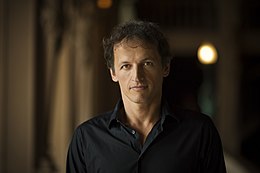Jean-Christophe Spinosi |
|---|
 |
|
| Born | (1964-09-02) 2 September 1964 (age 59)
Corsica, France |
|---|
| Origin | Brest, France |
|---|
| Occupation(s) | |
|---|
| Years active | 1991–present |
|---|
Musical artist
Jean-Christophe Spinosi (born 2 September 1964) is a French conductor and violinist, the founder of French orchestra Ensemble Matheus.[1]
Life and career
In 1991 he created the Ensemble Matheus in Brest, an orchestra which accompanies him throughout the world.[2]
In 2005, the Ensemble Matheus made a series of recordings devoted to Vivaldi:[2] they produced several albums and four operas. Simultaneously, he has continued to interpret the classical and romantic repertoire as well as many pieces from the 20th and 21st centuries.[3]
Different productions have since enabled Spinosi to enjoy musical friendships with artists such as Cecilia Bartoli, Marie-Nicole Lemieux and Philippe Jaroussky, with whom he recorded the album Heroes for EMI-Virgin Classics, a disc whose sales achieved triple-gold status.
From 2007, Spinosi conducted new opera productions every season with the Ensemble Matheus at the Théâtre du Châtelet, and he still regularly performs at the Théâtre des Champs-Elysées, and the Theater an der Wien or the Wiener Staatsoper.
For several years he has worked with stage-directors including Pierrick Sorin (for Rossini's La Pietra del Paragone in 2007 and 2014), [4]Oleg Kulik (for Monteverdi's Vespers for the Blessed Virgin in 2009), or again Claus Guth (for Handel's Messiah at the Theater an der Wien, 2009), Patrice Caurier and Moshe Leiser (for Rossini’s Otello at the Théâtre des Champs-Elysées and Salzburg Festival in 2014).
Spinosi has worked regularly with numerous orchestras including the Deutsches Symphonie-Orchester Berlin, the Orchestre de Paris, the Orchestra of Wiener Staatsoper, the Orchestre Philharmonique de Monte-Carlo, the hr-Sinfonieorchester Frankfurt, the Orchestre National du Capitole de Toulouse, the Scottish Chamber Orchestra, the New Japan Philharmonic, the Royal Stockholm Philharmonic, the Rundfunk-Sinfonieorchester Berlin, the Wiener Symphoniker, the ORF Radio Symphonieorchester Wien, the Orquesta de Castilla y Leon, the City of Birmingham Symphony Orchestra, the NDR Radiophilharmonie Hannover, the Mozarteum Orchester Salzburg, the Orchestre du Festival de Verbier, the Handel and Haydn Society from Boston, the Moscow Chamber Orchestra, the Osaka Philharmonic Orchestra, the Konzerthausorchester Berlin, the Orchestra of Staatsoper Hamburg. Spinosi appeared to conduct the Berlin Philharmoniker in 2021.
Spinosi and Cecilia Bartoli continued their close collaboration with two more Rossini operas, Otello at the Théâtre des Champs-Elysées and at the Salzburg Festival and La Cenerentola at the Salzburg Festival.
His most recent albums for Deutsche Grammophon, Lucifer with the Orchestre Philharmonique de Monte-Carlo and Miroirs with the Ensemble Matheus, both won the "Choc" award from Classica magazine.
In 2017 and 2018, he did a reunion with the Quebec ensemble Les Violons du Roy and the contralto Marie-Nicole Lemieux for the opera Carmen bringing together the forces of the Ensemble Matheus and the Orquesta Sinfónica de Castilla y León, Rossini's La Cenerentola at the Royal Opera in Stockholm , three successive productions at the Wiener Staatsoper (Carmen, The Barber of Seville and La Cenerentola) as well as a concert at the Prince's Palace of Monaco , leading the Orchester Philharmonique de Monte-Carlo.
